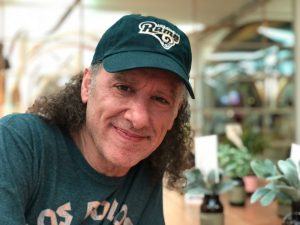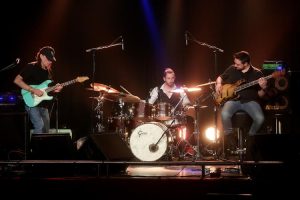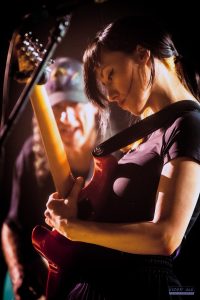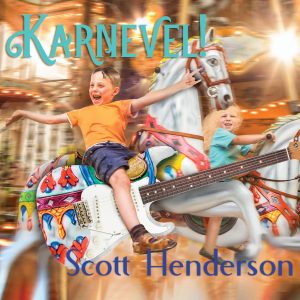
Casual music fans might not recognize the name Scott Henderson (www.scotthenderson.net), but area musicians from the 1970s, and fans of jazz/fusion internationally from the 1980s onward, all know the name of the greatest electric musician South Florida ever exported.
The guitarist released his seventh solo album, the self-produced Karnevel!, on Feb. 2, and has made 20 total recordings over the course of his career. And like the others, Henderson’s latest is an inimitable fusion of jazz, blues, rock, improvisation and humor.
Born at Good Samaritan Hospital in West Palm Beach in 1954, his otherworldly natural talents overwhelmed the local music programs at Palm Beach Junior (now State) College in Lake Worth and Florida Atlantic University in Boca Raton. Even in talented area acts such as the funk ensemble Pure Hell and jazz group Paradise, it was obvious that Henderson was destined to go much further.
In 1980, he did just that by relocating to Los Angeles, where he’s lived ever since. Within a few years of the move, he’d recorded and toured with icons like keyboardists Chick Corea (1941-2021) and Joe Zawinul (1932-2007) and violinist Jean-Luc Ponty. Henderson also formed the influential jazz/fusion band Tribal Tech, which recorded 10 albums and toured the world from 1984-2014.
His inclusion on the 1985 Ponty album Fables, and subsequent touring, came courtesy of one of Henderson’s few guitar peers. Legendary Brit Allan Holdsworth (1946-2017) was leaving Ponty’s band after touring and appearing on his albums Enigmatic Ocean and Individual Choice between 1977 and 1983. Knowing the violinist needed a replacement, Holdsworth called the Frenchman and glowingly talked Henderson into the gig sight-unseen.
“I was playing with [bassist] Jeff Berlin’s band and we opened for Holdsworth,” Henderson says by phone from his home in the downtown L.A. neighborhood of Eagle Rock. “Allan recommended me to Jean-Luc, who just took his word for it. I didn’t even need to audition. I just started playing with him, and did that for about the next three years.”
Additional albums under Henderson’s own name started with Dog Party in 1994. Karnevel!, like its preceding 2019 release People Mover, features his highly improvisational trio with younger French musicians Romain Labaye (bass) and Archibald Ligonniere (drums). Adding Polish guitarist Lina Mastalska, who recreates some of Henderson’s overdubbed parts live, they embarked as a quartet for a two-month tour through Europe, China and India in mid-February.
“I’m lucky to have them,” Henderson says. “It’s hard to keep up with them at my age. I was playing so much in Europe a few years ago that I asked for recommendations on European musicians. My agent at the time found Romain through Markbass, the bass amplifier company, and sent me some clips of him playing. Then Romain sent me clips of Archie. I wrote most of the material for the album during the COVID-19 lockdown, and they’ve added so much since to my initial charts. Some of the album sounds composed, but it’s not. It’s improvised.”
“As for Lina, she’s a great blues player and slide guitarist. I like to sometimes overdub higher piano-like voicings, which I can’t recreate live in a trio. With her, audiences sometimes get to hear two guitarists playing different voicings of the same chord, which can sound larger and more pianistic.”

Such musicality makes Karnevel! a feast for the ears. The basic tracks for its 11 Henderson compositions were impressively recorded live in the studio before the guitarist added his array of overdubbed tonal embellishments. The funky “Covid Vaccination” pays tribute to Tower of Power, borrowing from the Oakland, Calif., band’s song “Soul Vaccination” and featuring Labaye and Ligonniere mimicking the deep rhythmic pocket of its bassist Rocco Prestia (1951-2020) and drummer Dave Garibaldi. Henderson likewise mimics the band’s famed horn section by using an array of different effects.
“I used a different pedal for every horn,” says Henderson. “There’s distortion with a wah-wah pedal for trumpet, a fuzz tone for tenor sax, a different fuzz tone for alto sax, and a pedal called a Trombetta Robotone for trombone.”
“Bilge Rat” showcases the blues influence Henderson displayed through his early solo efforts; the high-octane “Sky Coaster” is fusion that’s not for the faint of heart, and the gorgeous “Greene Mansion” is a first-ever recorded solo guitar piece that would make Wes Montgomery proud.
Few musical artists are capable of similar diversity. And there’s not a hint of the syrupy instrumental pop, usually cloaked in saxes, guitars and synthesizers, known as “smooth jazz” (which the guitarist calls “Southern California hot tub jazz”). Henderson’s gifts even make the number of strings and frets on his instrument seem practically limiting. Unfortunately for American audiences, they’ll seldom hear such performances live other than on occasional club dates. Henderson no longer tours the United States.
“I didn’t really decide that,” Henderson says. “That decision was kind of made for me when I started working with European musicians, who need a $2,500 work visa to play over here. Which doesn’t seem fair, because I don’t need a visa to play in Europe. And the money that gigs pay in the U.S., factoring in air or ground travel, gas prices and gear rental, is honestly about one-fifth of what we get overseas. We were lucky to break even here.”
Influenced primarily by rock and blues guitarists including Jimi Hendrix, Jeff Beck, Jimmy Page, Ritchie Blackmore and Albert King, the jazz portion of Henderson’s jazz/fusion mix primarily involves that genre’s improvisational and tongue-in-cheek elements. His three-year stint with the Zawinul Syndicate in the late 1980s became a career highlight because of the improvisation within the Weather Report guru’s side project.

Tribal Tech, co-led by fretless electric bass wizard Gary Willis, decreed that humor was paramount — especially in the group’s lengthy final lineup with keyboardist Scott Kinsey and drummer Kirk Covington. On its 1993 album Face First, Covington added vocals to the song “Boat Gig” to poke fun at the schmaltz passing for music on most cruise ships. On the following album, 1995’s Reality Check, the quartet followed up a reverent reading of the jazz chestnut “Stella By Starlight” with a bombastic original sequel called “Stella By Infra-red High Particle Neutron Beam.” And in 2000, it released an entirely-improvised album, Rocket Science.
Kinsey mastered and played electronic percussion on Karnevel!, which was recorded by drummer Alan Hertz, who mixed the album with Henderson. Hertz had a lengthy recording and touring tenure with the fusion group Garaj Mahal before working with the guitarist, recording the latest three Henderson releases at Kingsize Soundlabs in L.A. He also played on Henderson’s final U.S. tours as well as on his 2015 gem Vibe Station.
As a solo artist or sideman, Henderson has also worked with a who’s-who of heavyweights, jazz/fusion and otherwise: bassists Berlin, Victor Wooten, John Patitucci and Dave Carpenter; drummers Dennis Chambers, Dave Weckl, Steve Smith and Virgil Donati; vocalist Thelma Houston, saxophonist Albert Wing, and keyboardists Tom Coster and T. Lavitz.
“If wars were fought with notes instead of bullets, Scott would be the guy you’d want on your side,” says Charlie Gonzales, singing bassist for longtime South Florida roots rockers The Dillengers.
Yet having that kind of arsenal doesn’t mean one always has to use it. Henderson’s deep influence on fellow musicians in general, and guitarists in particular, also involves his use of space between notes, along with his phrasing, use of effects, and signature tone, technique, taste and touch. Few other players on any instrument can come as close to exactingly mimicking parts they’re hearing in their head, live and in real time.
At a 1997 Tribal Tech show at the Carefree Theater — now a vacant lot in West Palm Beach after hurricane damage hastened its demolition — an introduction displayed both Henderson’s influence and reasoning behind leaving South Florida’s stunted music scene. In attendance was young guitarist Jonathan Kreisberg, a gifted recent University of Miami music grad who’s since charted a successful career with a dozen albums under his name and rising star status, especially in Europe.
“Great to meet you, Scott,” Kreisberg said. “Do you have any advice for me?”
“Get the hell out of here,” Henderson replied.
Kreisberg returned to his native New York City soon thereafter and now lives in Brooklyn. And Henderson’s latest South Florida show was back in 2009, when he played at the now-defunct Orange Door in Lake Park with drummer Hertz and former Ponty bassist John Humphrey.

With his online lessons, multiple instructional books and videos, and ongoing students at the Musicians Institute in Hollywood, Henderson has practically always been a teacher as well.
“I was a student of Scott’s at Chafin MusiCenter in Lake Worth in 1979-1980,” says veteran local singer, guitarist and songwriter John Storch. “He’d gone to high school with one of my older sisters and was renting my grandfather’s house, so we became friends. I was still in high school then, and Scott would come out to see how I was progressing with our kid band at the time, SST.”
Along with songwriting partner and older brother Bill Storch, a fellow singing guitarist, John Storch has since traversed additional rock, roots music, ballet scores and instrumental electronica in ensembles from Lake Worth Beach to Boston and New York City.
“We went to see Scott with Chick Corea when we were living in Boston,” he says. “He got us backstage passes, and his playing was absolutely amazing. But he was always mind-blowing. Even when we were in high school, before we’d been exposed to many truly great musicians, we could tell he was a special phenomenon when we saw him play with Paradise.”
Karnevel!, with its carny imagery and theme, was inspired by such visits Henderson has taken with his daughter Angela since becoming a father. It’s a reflective look back that’s perhaps befitting of such a small town boy who made good — and one who will turn 70 years old this summer in his adopted hometown, the City of Angels.
“It’s hard to believe,” the age-defying Henderson says. “Angela is 20 years old now and studying theater at the University of California, Berkeley. She even came up with the CD cover concept of the kid riding a guitar. And I actually still feel like I could do all this for another 20 years, as long as my back doesn’t go out from the hotel beds overseas, which sometimes seem like medieval torture devices. Or the flying. But our agent is good at routing us so we usually drive no more than three to four hours gig to gig. The flights here to Europe and back, plus from Europe to China and back, will be the toughest part for me.”